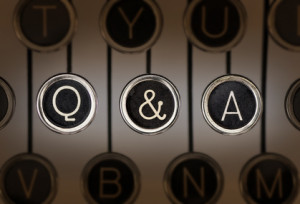 It’s the third Monday of the month, and that means it’s time to look at a grammatical question sent in by one of my readers. Today’s question has us looking at quotation marks.
It’s the third Monday of the month, and that means it’s time to look at a grammatical question sent in by one of my readers. Today’s question has us looking at quotation marks.
My thanks to the reader who sent this in. Here’s the question:
I know when there’s a quotation, the end punctuation goes inside the quotation marks. Like this: “Where are you going, Mommy?”
But what about when there’s a word or phrase in quotes at the end of a sentence?
Is it: Bobby called it his “magic string.”
Or is it: Bobby called it his “magic string”.
Good question! Click to read the answer:
How you use quotation marks, and how you mix them with other punctuation, depends on where you live. The UK (and places like Australia and New Zealand, and to a lesser extent, Canada) follow one style, the US follows another.
Let’s do the US style first, since the question was sent by someone in the US.
In the United States, quotation marks go outside the punctuation. So the example sentence would be written as
Bobby called it his “magic string.”
~~~
In the United Kingdom, on the other hand, quotation marks stay with the phrase, if it’s a short phrase like this. (If it’s dialogue, the quotation marks for the dialogue go outside the punctuation.) So the example in this case would be written
Bobby called it his “magic string”.
~~~
Let’s take the discussion one step further than the original questioner did, and see what happens if that phrase is put into dialogue:
In the United States, dialogue is marked with double quotation marks, and a phrase that is being set off from the rest of the sentence would then be placed in single quotation marks. ALL the quotation marks would go outside the punctuation.
Jenny said, “I heard Bobby call that his ‘magic string.'”
~~~
In the United Kingdom, dialogue is marked with single quotation marks, and a phrase is set apart with double quotation marks. The quotation marks that go with the phrase stay with the phrase, before the punctuation.
Jenny said, ‘I heard Bobby call that his “magic string”.’
~~~
I might also mention that in Britain, quotation marks are generally called inverted commas.
We could go further, and get tangled in the different ways different punctuation marks are treated with quotation marks, but I think we’ll leave that for now.
~~~
If you want to read further, I’d suggest these links:
Oxford Dictionaries on quotation marks
Grammar Girl on quotation marks
~~~
I hope this has answered my reader’s question satisfactorily.
I’m always glad to receive questions on grammar or word use quandaries that you may have. Send your questions to mail (@) flubs2fixes (dot) com (remove brackets and spaces, of course), and join me again on the third Monday in February for another Word with Beth!

Fabulous explanation, Beth! My ICL instructor had corrected my UK usage into American usage but I actually didn’t realize I wasn’t wrong (just that I was schooled in a Common Wealth country!). 🙂
Great explanation, Beth! And I learned something new – I didn’t know that in the UK quotation marks are single! That explains why a book my husband received for xmas is printed that way. We had a discussion about it that we chalked up to choice of font, but I’m glad to know the real reason!
I thought punctuation was universal! I learned something new today 🙂
Wow, how confusing! Thanks for your clarity!
Good info. I always have to stop and think about when dialogue is marked with double quotation marks, like your example: Jenny said, “I heard Bobby call that his ‘magic string.’” It just doesn’t look right.
Great answer, Beth! Thank you. I have flubbed this more times than I can count. ….Well, either that or I’m British! 🙂
I write the example the British way – it looks right. But I use the ” for the dialogue and the ‘ for people quoting something/one in dialogue.
I write like this: Bobby and his magic string are the founders of “We are Knot Magicians”./ Jeremy whispered “Did you know that Bobby and his magic string are the founders of ‘We are Knot Magicians’?”